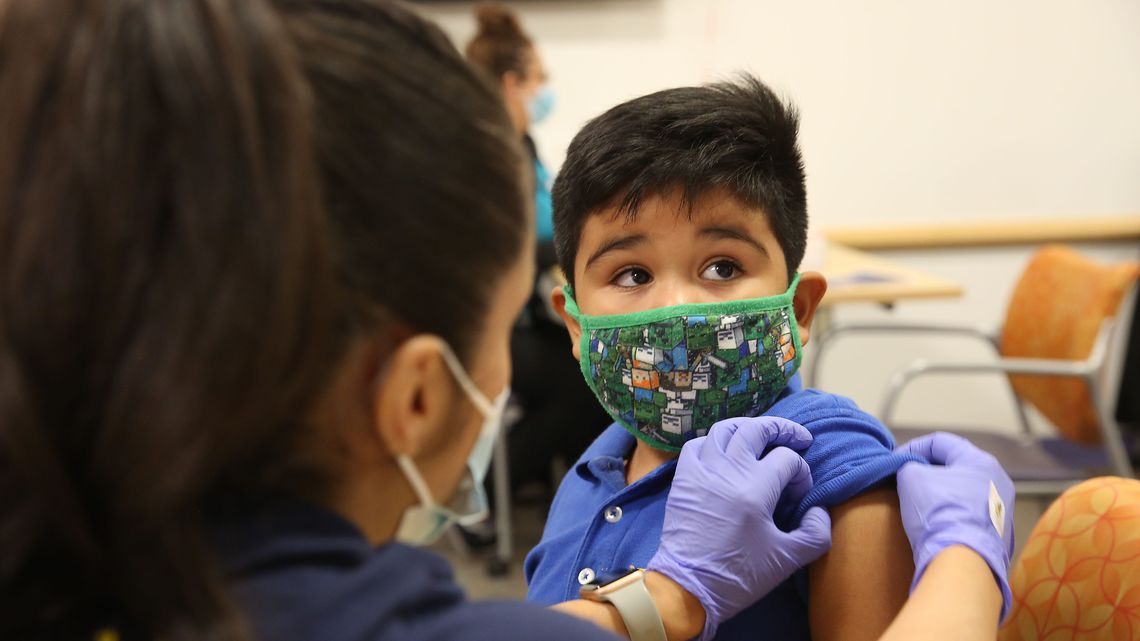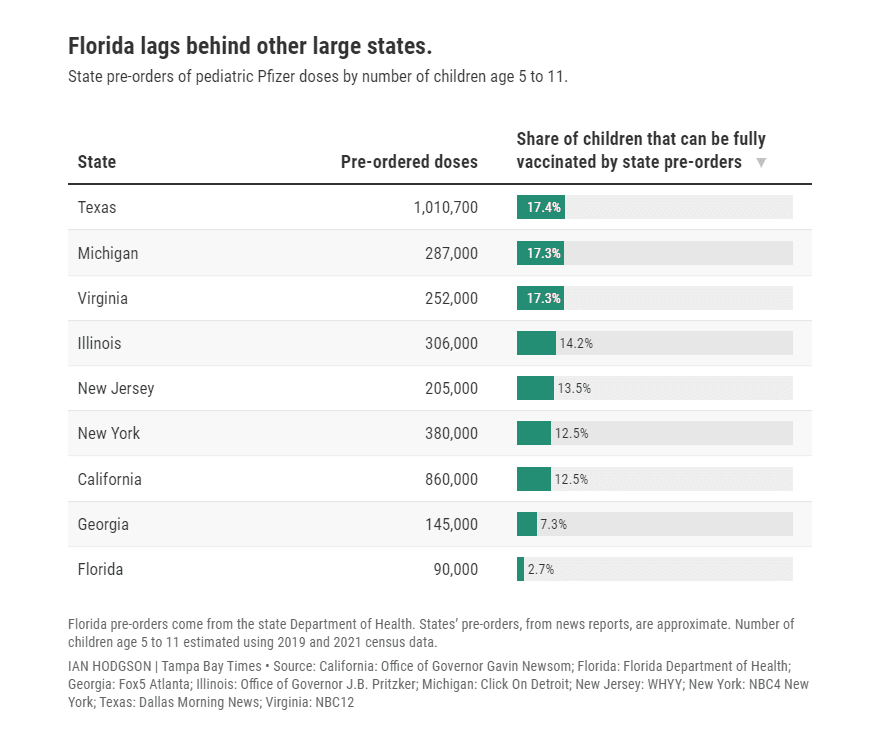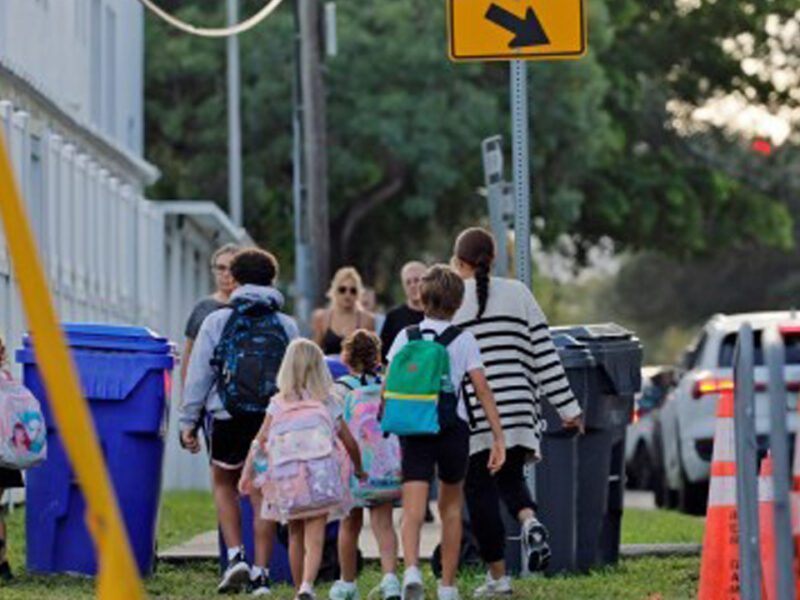
Florida ordered 90,000 doses of the child vaccine. Texas ordered 1 million.
Compared to eight other states, Florida preordered the least number of child-size coronavirus vaccine doses. But there doesn’t appear to be a shortage.
Tampa Bay Times | By Ian Hodgson and Kirby Wilson | November 11, 2021
TALLAHASSEE — Florida health officials say they preordered approximately 90,000 child-size doses of the Pfizer vaccine. That’s enough to fully vaccinate 3 percent of Florida’s approximately 1.7 million children ages 5 to 11.
Texas, another Republican-led state, preordered 1 million doses — enough to fully vaccinate over 17 percent of the state’s children in the same age group. California preordered 860,000 doses, enough to fully vaccinate 13 percent of kids there.
The federal government does not publicize the amount of vaccine states are ordering through its distribution clearinghouse. The Tampa Bay Times compared Florida’s preorder to what eight other states have reportedly ordered. Florida, the third-most populated state, ordered the least of the nine.
Florida’s order is less than the 231,000 doses reportedly headed to New York City.

Those reported figures do not account for all of the vaccine available in those states. And these are only the first shipments. More pediatric doses of the Pfizer vaccine will be sent out.
Some private providers, such as large pharmacies, order doses directly from the federal government. That means in Florida, companies like CVS or Publix do not have to draw its supply from the 90,000 doses ordered by the state. Supply issues stemming from the number of doses ordered by a state would not affect large pharmacies, but it could affect pediatricians or other providers.
In the Tampa Bay area, there doesn’t appear to be a shortage of child-sized doses, said BayCare Pediatric Service Line Medical Director Dr. Christina Canody.
“Both the commercial chains and the private pharmacies around Tampa Bay currently have adequate supply of the vaccine,” she said.
The size of a state’s order signals how that state plans to distribute the pediatric vaccine. Last month, California announced that students must be vaccinated for in-person learning. The state will distribute doses through more than 4,000 state vaccination locations, including 3,100 school clinics, according to the governor’s office. Texas says its one million doses will be distributed to 900 providers across the state.
Florida is taking a more laissez-faire approach to distributing the vaccine, relying on doctor’s offices, pharmacies and county-run clinics. Florida has taken the same approach to distributing booster shots to elderly and at-risk residents.
Some school districts are helping inoculate children, such as Miami-Dade, Broward, Orange, Seminole, Okaloosa and Escambia counties. Tampa Bay’s school districts — Hillsborough, Pinellas and Pasco — say they have no plans to help vaccinate children.
Florida Department of Health spokesperson Weesam Khoury said in a Wednesday email that the 90,000 doses were an “initial supply” to be delivered this week. She said the state will “continue to ensure COVID-19 vaccines are widely available statewide,” noting that Florida had ordered an additional 270,000 doses “to fulfill provider requests.”
According to a Department of Health document, doses ordered before Nov. 9 by providers like pediatricians should be delivered by Friday. Earlier in the week, some providers were able to pick up doses from the state Department of Health sitesin their counties.
As of Thursday, CVS and Walgreens locations across the Tampa Bay area still had available appointments for children 5 to 11. Miami-Dade area locations of those pharmacies also appeared to be well stocked.
University of Florida epidemiologist Cindy Prins said Florida’s reliance on the private sector would serve most of the state’s population well but could still leave some behind.
She noted that some low-income communities don’t have a grocery store chain or pharmacy chain nearby. Many families in those communities also rely on public transportation and may be uninsured or under-insured, meaning they don’t have a regular doctor where they could get their children vaccinated.RELATED: What is Florida’s plan for coronavirus vaccine boosters?
When the vaccine was first rolled out to the general public, those communities were served by pop-up or mobile vaccination clinics. But the state’s plan to rely on the private sector could mean fewer of those options this time.
“We need to think about people who live in under-served areas,” Prins said. “It’s important to make sure we don’t forget those kids.”
The state will also have to combat vaccine hesitance among some parents. A survey conducted by the Kaiser Family Foundation in October found that 30 percent of parents said they would “definitely not” get their 5 to 11 year old vaccinated.
The vaccine has been proven to be safe and effective for children between 5 and 11. According to clinical trials, the child-size dose works just as well, if not better, for children in that age group while minimizing potential side-effects.RELATED: Experts explain why kids ages 5 to 11 should get the COVID vaccine
Clinics have seen a various reactions from parents, Canody said, “from the early adopters, who’ve been waiting for this moment,” to the more hesitant “who need to see how it rolls out.”
Many parents may be waiting until a convenient time, she said, like a weekend or holiday when their child will have time to recover from any side-effects of the vaccine.
The state has not yet released data showing how many children have gotten the vaccine since it was approved on Nov. 2. The state releases a weekly COVID-19 report every Friday after 5:30 p.m.
Prins said getting shots in the arms of as many children as possible is vital.
“It’s another critical step to see less circulation of the virus,” she said. “Florida has come down from our delta wave but we don’t know what variants are around the corner.”
Times staff writers Jeffrey S. Solochek and Christopher O’Donnell contributed to this report.





